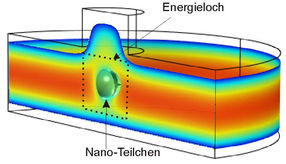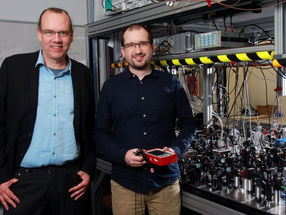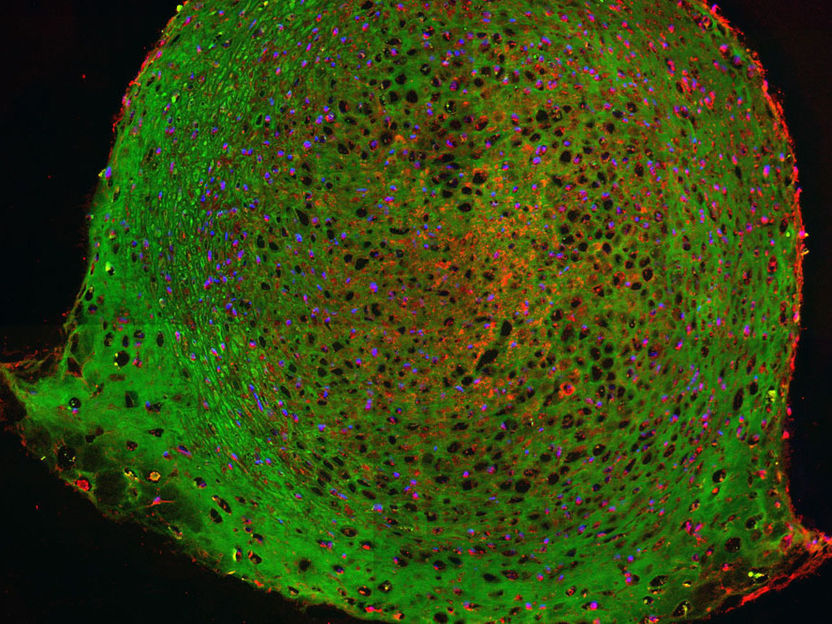Berlin is set to become a hotspot for the development of innovative therapies
More than just a ground-breaking ceremony: start of construction for the Berlin Center for Gene and Cell Therapies
Advertisement
The ground-breaking ceremony marked the start of construction work on the Berlin Center for Gene and cell therapies - a project with the potential to make Berlin a hotspot for the development of innovative therapies. Bayer AG and Charité - Universitätsmedizin Berlin had only presented the plans for the joint project in June last year, and now the start of construction in Berlin-Mitte was officially launched together with the new partner Berlin Institute of Health at Charité (BIH) in the presence of the Federal Minister of Finance Lars Klingbeil, the Federal Minister of Research, Technology and Space Dorothee Bär and Kai Wegner, the Governing Mayor of Berlin.
The Berlin Center for Gene and Cell Therapies is intended to promote "translation" in the field of gene and cell therapies, i.e. to translate groundbreaking technologies from basic research into concrete treatment options more quickly. This is because gene and cell therapies offer hope for all those people for whom conventional therapies have failed or for whom there is no effective treatment to date. The aim is to create a biotech ecosystem that supports start-ups in bringing their approaches to novel therapeutics into clinical development. The center is significantly funded by the Federal Ministry of Research, Technology and Space (BMFTR) and the state of Berlin.
Since the start of the project in June 2024, Charité and Bayer have gained another cooperation partner in the BIH. Together with the project developer iQ spaces, the three cooperation partners are celebrating the ground-breaking ceremony for a building that will form the core of the project. The ten-storey building with a total area of around 20,000 m² is being built at Berlin's Nordhafen and will be home to the Berlin Center for Gene and Cell Therapies (BC GCT) as well as other tenants.
These tenants include Bayer Co.Lab Berlin, a start-up incubator that has been supporting biopharma start-ups with fully equipped laboratories, offices, expertise and a network since 2024. With the relocation and expansion in 2028, Bayer Co.Lab will contribute relevant experience to the new project and the emerging community.
The BC GCT is divided into an incubator with fully equipped laboratory and office space and room for 15 to 20 start-ups in various stages of development as well as a production facility certified according to Good Manufacturing Practice (GMP) standards for the development of gene and cell therapeutics up to clinical phase II.
The architectural firm HENN has been commissioned with the general planning. The BC GCT incubator is operated by Gene and Cell Therapies Incubator Berlin GmbH, which Charité and Bayer founded specifically for this purpose. The BIH has commissioned the Berlin Contract Development and Manufacturing Organization (CDMO) ProBioGen to operate the GMP facility. The Berlin Center for Gene and Cell Therapies is scheduled to open in 2028.
Comments on the groundbreaking ceremony
Lars Klingbeil, Federal Minister of Finance: "We are investing in growth and innovation. In doing so, we are focusing on future-oriented sectors such as biotech. The Berlin Center for Gene and Cell Therapies supports start-ups in bringing innovative treatments directly to patients - and creates good, future-proof jobs in Germany."
Dorothee Bär, Federal Minister of Research, Technology and Space: "Today's ground-breaking ceremony for the Berlin Center for Gene and Cell Therapies demonstrates a successful public-private cooperation between Charité, the Berlin Institute of Health, Bayer AG and ProBioGen AG and is exemplary for Germany's high-tech agenda. The Berlin Center for Gene and Cell Therapies brings researchers and entrepreneurs together and thus makes real innovations possible. The National Strategy for Gene and Cell Therapies has thus also become a reality. This not only means new momentum for the biotech sector in Germany, but also hope for a large number of patients and those affected by serious and rare diseases."
Kai Wegner, Governing Mayor of Berlin: "Our goal is clearly defined: We want to create a 'Boston on the Spree' - and develop new and pioneering therapies for patients in a center for biotech here in Berlin. The translational center for gene and cell therapies is the first central building block of a life science campus in the heart of Berlin, where science and research, start-ups and established companies are working on the future of medicine. The ground-breaking ceremony for the new biotech center is also an impressive commitment by two top players in the healthcare industry - Charité and Bayer AG - to Berlin as a location for science, innovation and technology."
Franziska Giffey, Mayor and Senator for Economics, Energy and Public Enterprises of the State of Berlin: "This ground-breaking ceremony is a milestone for a flagship project that will radiate far beyond Berlin! We are sending out a clear signal for the medicine of the future in Berlin and strengthening Germany's position in the global biotech competition. Work is being done here to better diagnose, treat and, in the best case, cure previously incurable diseases. This means hope for patients and a boost for the healthcare industry in our city. The close collaboration between science, industry and start-ups demonstrates the strengths of the Berlin ecosystem. I would like to thank everyone who is working tirelessly for the success of this project - together we are securing Berlin's place as Europe's leading innovation metropolis."
Dr. Henry Marx, State Secretary for Science and Research of the State of Berlin: "With the new Berlin Center for Gene and Cell Therapies, we are further expanding Berlin's position as one of the most important science locations in Europe. The project impressively demonstrates how groundbreaking research is being carried out here, from basic research to therapy for patients - all under one roof. This proves once again: when it comes to medicine and life sciences, there is no way around Berlin."
Prof. Heyo K. Kroemer, Chairman of the Board of Charité: "With gene and cell therapies, we are pushing the boundaries of what is medically possible. By combining both research and production of these highly innovative drugs under one roof, the Berlin Center for Gene and Cell Therapies shortens the path from the experimental stage to application. In this way, we ensure that patients benefit from significant medical progress as quickly as possible. With the center, Charité is assuming its responsibility as a university hospital and at the same time strengthening Berlin's profile as an internationally visible biomedicine location."
Prof. Christopher Baum, Chairman of the BIH Board of Directors and Head of Charité's Translational Research Department: "At the BC GCT, the National Strategy for Gene- and Cell-Based Therapies is becoming a reality: with the help of funding from the Federal Ministry of Education and Research, which amounts to 76.5 million euros over the next 10 years, we are building a state-of-the-art GMP facility for the production of gene and cell therapeutics as part of the center. We are delighted to have found a competent and experienced partner for the construction and operation of the GMP facility in the Berlin-based company ProBioGen AG. We are thus setting new standards for the safe and sustainable manufacture of pharmaceutical products and bringing research directly into application."
Stefan Oelrich, member of the Board of Management of Bayer AG and Head of the Pharmaceuticals Division: "The ground-breaking ceremony for the new building for the Berlin Center for Gene and Cell Therapies and the Bayer Co.Lab is a signal that Germany, as a center of innovation and industry, wants to be at the forefront of the key technologies of the 21st century. Our aim is to ensure that start-ups 'Made in Germany' grow locally and that globally successful therapeutic options continue to be developed in Germany. The public-private partnership between Charité, the Berlin Institute of Health and Bayer shows how crucial a joint commitment is in order to fully develop the potential of transformative technologies - for the benefit of patients worldwide."
Note: This article has been translated using a computer system without human intervention. LUMITOS offers these automatic translations to present a wider range of current news. Since this article has been translated with automatic translation, it is possible that it contains errors in vocabulary, syntax or grammar. The original article in German can be found here.
Other news from the department science
Most read news
More news from our other portals
Something is happening in the life science industry ...
This is what true pioneering spirit looks like: Plenty of innovative start-ups are bringing fresh ideas, lifeblood and entrepreneurial spirit to change tomorrow's world for the better. Immerse yourself in the world of these young companies and take the opportunity to get in touch with the founders.
See the theme worlds for related content
Topic world Gene therapy
Genetic diseases once considered untreatable are now at the center of innovative therapeutic approaches. Research and development of gene therapies in biotech and pharma aim to directly correct or replace defective or missing genes to combat disease at the molecular level. This revolutionary approach promises not only to treat symptoms, but to eliminate the cause of the disease itself.

Topic world Gene therapy
Genetic diseases once considered untreatable are now at the center of innovative therapeutic approaches. Research and development of gene therapies in biotech and pharma aim to directly correct or replace defective or missing genes to combat disease at the molecular level. This revolutionary approach promises not only to treat symptoms, but to eliminate the cause of the disease itself.

































































